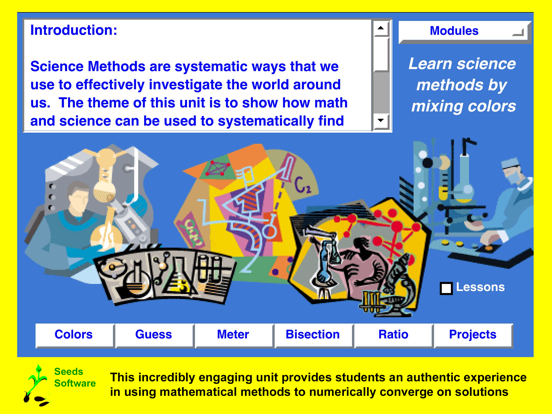SciMthds Search
iPad / Education
This App uses a very fun and engaging activity involving mixing three primary colors to match a given specimen of unknown mixing. The challenge is to find the combination of primary color intensities that make up the target specimen color in as few test tries as possible.
It is a very simple activity; but one that can be made ever more challenging by dialing down the allowable matching error. With the introduction of an error measurement meter and mathematical methods of seeking convergence, this activity also becomes an elegant means of giving students valuable insights and experiences into the application of math to find solutions.
Whereas the natural tendency is to try to solve the mixing using trial and error, with this unit students will discover how ineffective guessing is and how much more successful mathematical methods are at efficiently converging to the solutions.
The unit is structured and carefully differentiated to work over a wide range of abilities, and can be employed to support many learning standards, so that its use can span classrooms from grades 3 to 12 and/or can be used for learning at home.
COLOR THEORY:
Introduce students to color theory and how monitors use primary colors to generate a wide gamut of color hues while having fun doing color matching activities that can be stepped up in challenge level.
SCIENCE METHODS INCLUDE:
Pattern Recognition
Information Modeling
Accuracy and Error Measurement
Systematic Problem Solving
Solution Convergence
SOLUTION STRATEGIES:
Guess
Error Measurement
Bisection
Ratio
Gradient
APP CONTENT:
* Five Computer Simulations of Color Mixing & Problem Solving Methods
* 3-Dimensional Information Modeling
* Simulation of Three Different Experimental Design Scenarios
* Seven classroom activity lessons with objectives
* Three hands-on lab plans with material lists, notes
* Teacher Lesson Answers and Lab Guidance
PROBLEM SOLVING:
At its foundation, this App teaches students how math and science can be used to find experimental solutions; it introduces students to the important ideas and methods of Experimental Design. How do you match the color, to repaint a car that has been damaged, when the original color of the car has faded? How do you mix several color dyes together for an accessory when you wish to match the color of a dress? How does an astronomer determine the abundance of a certain heavy metal in the photosphere of a star when the observed spectrum is affected by the temperature, density, and pressure of the star? Experimental Design problems abound in all aspects of life; the question asked often is how much of several known inputs are needed to get the results desired.
By doing similar color mixing experiments on the computer, students will discover how much more rapidly they can: do the color mixing tests, investigate solution strategies, and develop pattern recognition. They will experience how computers are used as a tool to study real world problems and learn solution strategies.
To enhance connections to the physical world, the App includes write-ups for labs that are easy to put together and use to work the concepts offline as well. Students perform experiments mixing food-coloring dyes, trying to match a color of unknown formulation. These labs help the students grasp the issues and develop an awareness of the difficulties in arriving at an experimental solution; it provides greater insights into how such problems are actually solved in science and industry. Direct links between computer technology, numerical methods, and the lab experiments are established in simulating the same type of experiments on the computer.
Quoi de neuf dans la dernière version ?
App updates for iOS15



